Adopt A Child In India - Rules and Regulations
Posted On : June 1, 2022
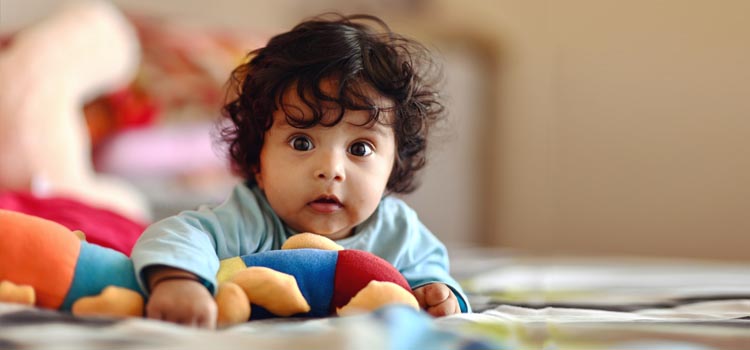
Table of Contents
Children are the ultimate blessing of God who bring hope, prosperity and happiness in a house. In Hindus, there are 16 sanskar from birth till death, one of which is parenthood as well. Sometimes, a couple may not be able to conceive naturally due to medical reasons, or someone may not be willing to marry someone but have a family of their own. In such cases, adoption may seem the best solution. It also allows helpless children to start a new life. Know the legal aspects around the process to adopt a child in India.
How to Adopt a Child in India?
Adoption can be understood as the concept of permanent separation of a child from biological parents and becoming a lawful child of prospective adoptive parents with all the rights and responsibilities as a biological child[1]. Adoption is a subject of family laws in India and there are certain legislations governing the concept. Adoptive parents, whether single or married, have to show their interest for adoption and comply with a certain legal process in order to adopt a child. The process to adopt a child in India has been explained below.
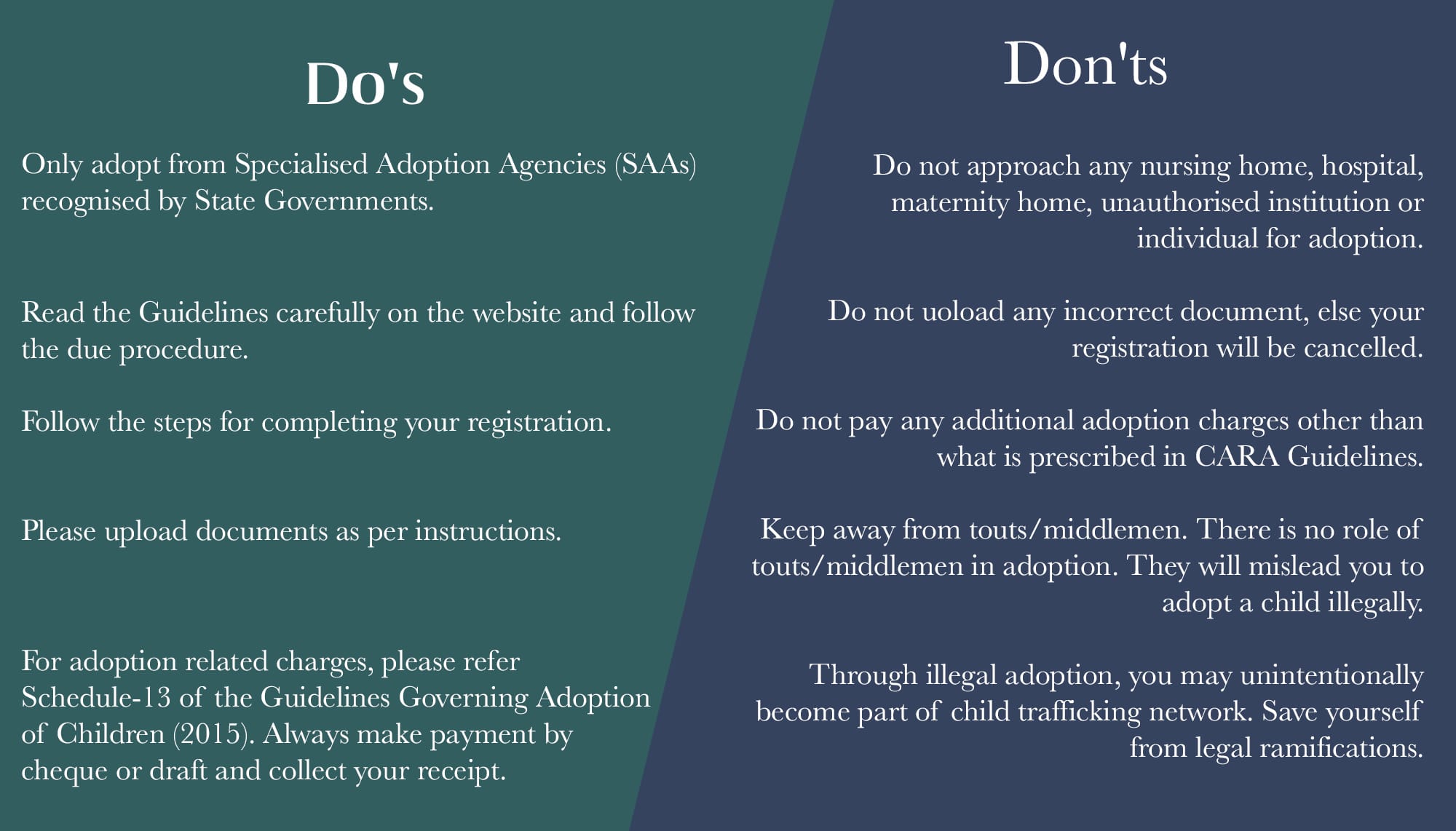
What are the Adoption Laws in India?
Had the Article 44 of the Constitution of India been implemented, the Uniform code for adoption in India would have been a reality. However, the matter still remains in debates and religious laws govern the civil lives of people in India. Another aspect of civil laws is the child adoption law in India which is again a subject of personal laws. Hindus have had the concept of adoption through ‘Dattak putra’ since ages. But in Muslims, Christians, Parsis, etc., adoption is not a valid approach. For them, secular laws have the say to adopt a child in India. Below are the legislations that lay the rules and regulations for adopting a child in India:
- Hindu Adoption and Maintenance Act, 1956
- Juvenile Justice (Care & Protection of Children) Act, 2015
- Model JJ Rules, 2016
- Adoption Regulations, 2017
- Guardianship and Wards Act, 1890 (GAWA)
In concern with the rules to adopt a child in India, the Hindu Adoption and Maintenance Act, 1956 lays the requisites for adoption among Hindus. There is no such provision in any other religion. In fact, the Muslim laws prohibit the concept of adoption since an adopted child is not a relative and thus, legally permissible to marry the adoptive parents as well. Hence, in such cases, rather than adoption, guardianship is resorted to. However, it does not give express parental rights to the adoptive parents (called guardians in such cases). In return, just like other wards, children can leave their guardians once they are major, i.e. attain the age of 18 years. In other scenarios, adoption can be made under the provisions of Juvenile Justice Act, 2015.
What is the Procedure to Adopt a Child in India?
There are several stages for adoption in India since it is a family affair involving many lives. There are laws whose compliance has to be verified in order to uphold the rights of everyone involved during the process to adopt a child in India. There are various aspects related to laws for child adoption in India. In country and inter-country adoption, relative and non relative adoption, adoption by step parents, etc. are certain subjects. There are specific provisions for adopting a child in India for NRI, OCI and foreigners as well. The child adoption process varies keeping regard with all such facets.
Adopt a Child in India: In-Country Adoption
- The child must be orphaned/ abandoned or surrendered and has to be legally free for adoption.
- The prospective adoptive parents have to do online registration for child adoption in India Child Adoption Resource Information and Guidance System (CARINGS) and submit the requisite documents.
- As per the preference, children's profiles are shared with prospective parents which has to be reserved within 48 hours.
- Adoptive parents in India have to approach the Specialised Adoption Agency (SAA) who files an application before the court of jurisdiction.
- The court verifies that the adoption is in accordance with the Section 60 of JJ Act.
- Since the case of adoption in India is not adversarial, there is no opposite party to contest during arguments of SAA in the court of law.
- A certified copy of the adoption order is received by SAA from the court and forwarded to the adoptive parents.
- SAA then applies to the authorities for issuing birth certificates containing names of the adoptive parents and date of birth as per adoption records.
- The child is finally adopted by the prospective parents. The authorities shall prepare follow up reports on six monthly basis for two years. Thus, relocation of adoptive parents also needs to be conveyed to the authorities during this period.
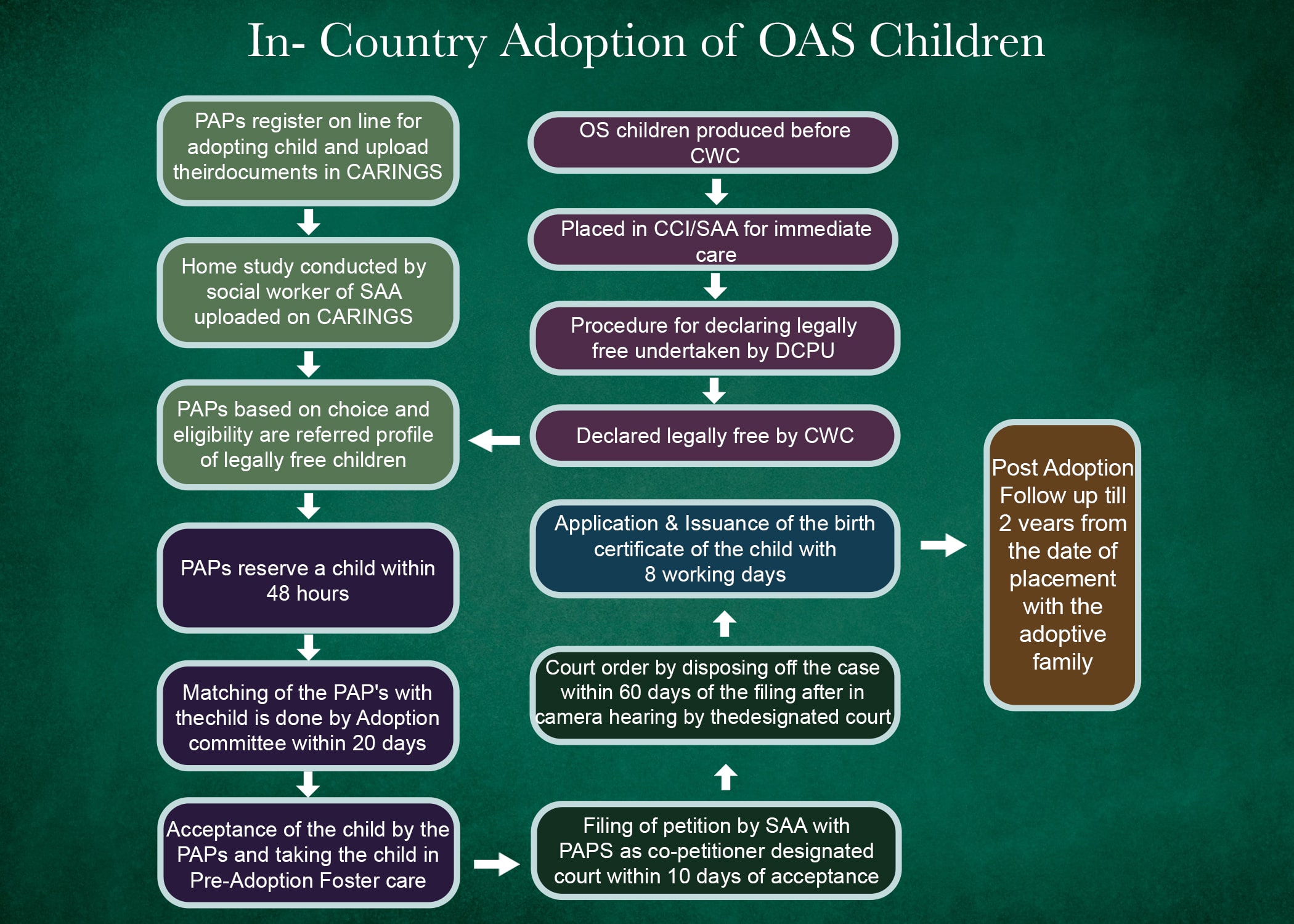
Adopting a Child in India Process for Relatives
Adopting a relative’s child is common in India. What is not common is completing the legal process to adopt a child in India. People belonging to adoptive parents and the biological parents often orally decide regarding adoption and give away the said child. With such a lack of documentation, legal troubles may arise in future. If a childless couple decides to adopt a child in relation[2], legality has to be satisfied as explained below.
Relatives Who can Adopt a Child in Relation
- A paternal uncle - Father’s brother or brother-in-law, i.e. Chacha, Taya or Phupha.
- A paternal aunt - Father’s sister or sister-in-law, i.e. Bua, Chachi or Tayi.
- A maternal uncle - Mother’s brother or brother-in-law, i.e. Mama or Mausa.
- A maternal aunt - Mother’s sister or sister-in-law, i.e. Mausi and Mami.
- Paternal grandparent - Father’s parents, i.e. Dada or Dadi.
- Maternal grandparent - Mother’s parents, i.e. Nana or Nani.
Relatives of a child have to file an application for adoption under Sections 56 (2) and 60 (1) of the Juvenile Justice Act, 2015 in the competent court. In this case, the Family Court or District Court or City Civil Court of the district where the adoptive child stays with his/ her biological parents is the competent court. The application has to be accompanied with a consent letter of biological parents or permission by CWC (as the case may be) regarding the said adoption. Other documents usually required for adoption as per the Adoption Regulations, 2017 (list provided below) also need to be accompanied with the adoption petition. In case of any kind of confusion regarding the legal procedure involved, consultation with adoption lawyers in India may help attain clarity.
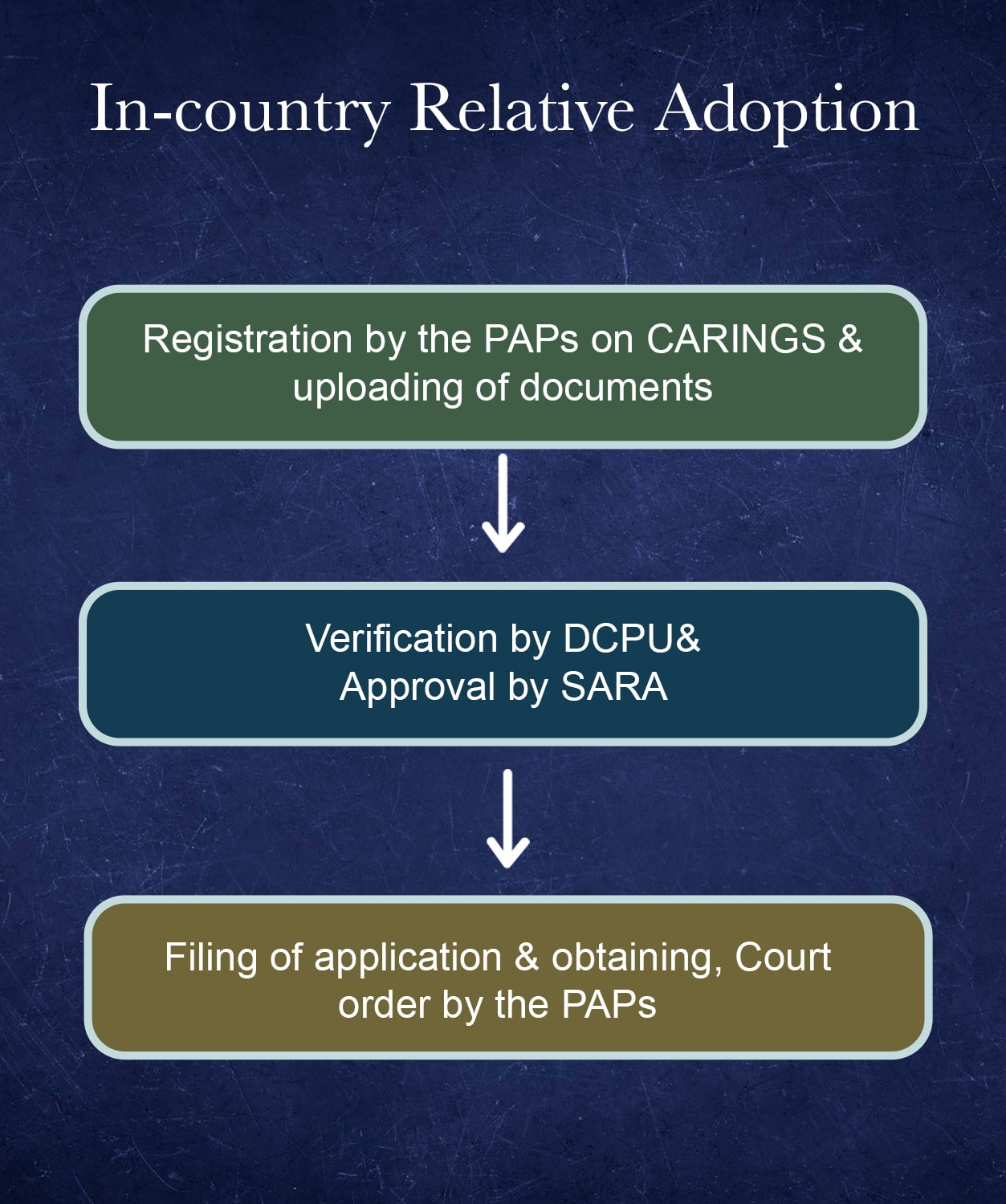
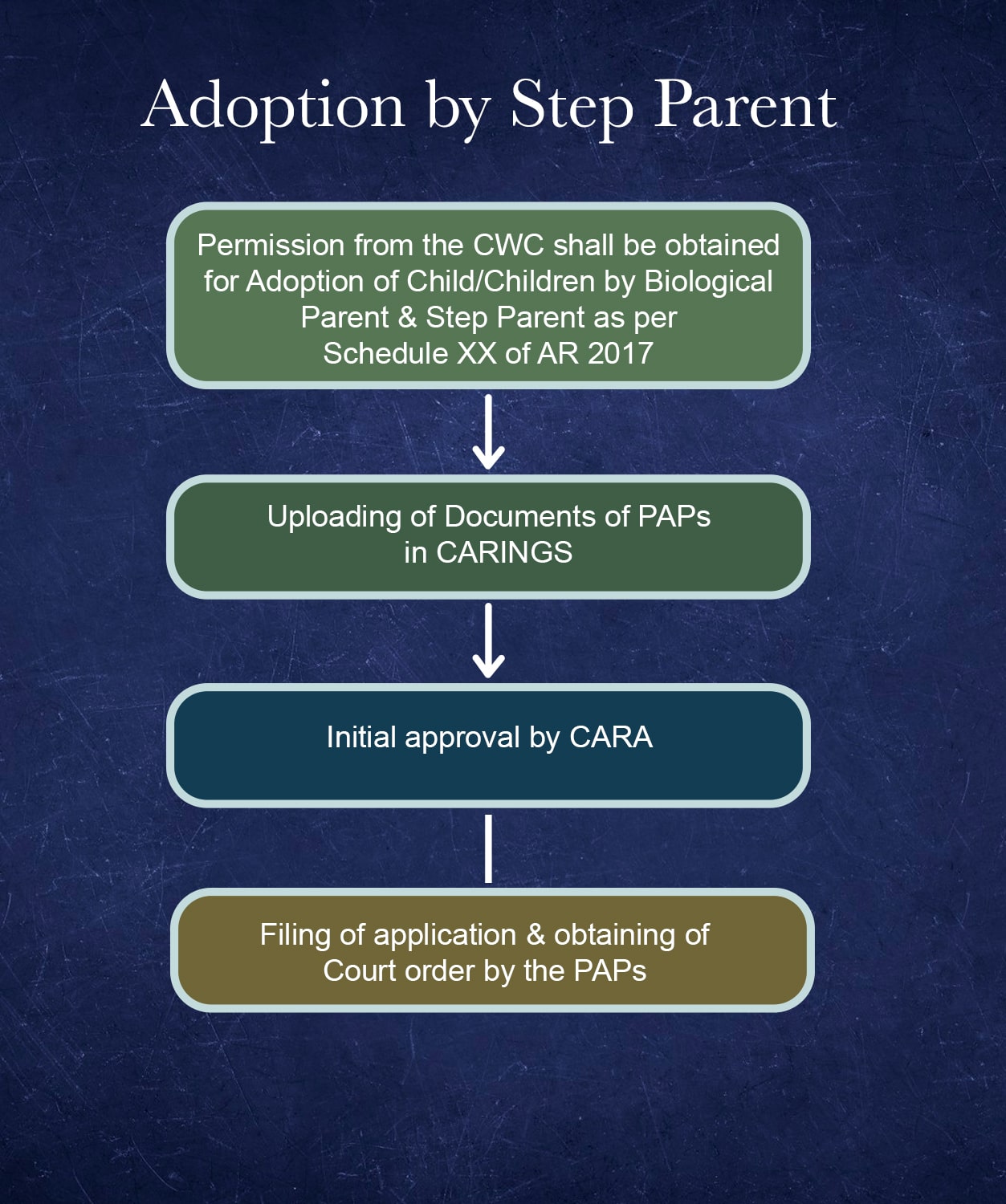
Inter-Country Adoption Among Relatives in India
- The definition of a relative is the same as above for NRIs or OCIs in order to adopt a child in India.
- The concerned adoptive parents have to approach the authorities for preparation of Home Study Report and online registration for child adoption in India at Child Adoption Resource Information and Guidance System (CARINGS).
- The authorities in such a case may be the Authorised Foreign Adoption Agency, or the Central Authority, or Government department, or Indian diplomatic mission (for Indian citizens in another country).
- After the Home Study report, the adoptive parents may be registered on CARINGS and submit requisite documents.
- The authorities through District Child Protection Unit may also conduct a background check of the relative child proposed for adoption and the report will be forwarded to the concerned authorities at the receiving country.
- The adoptive parents have to file an application in the competent court under Section 2 (52) or 60 (1) of JJ Act, 2015 for inter-country relative adoption. The application has to be accompanied with a consent letter of the biological parents of such a child.
- The matter shall be heard before the court keeping regard with the welfare of the child concerned.
- A certified copy of the adoption order has to be collected by the prospective parents and given a copy to the District Child Protection Unit for online submission to the concerned authority.
- No-Objection Certificate in favour of the adoption of the child has to be obtained within 10 days of the adoption order and forwarded to the concerned authorities in the receiving country.
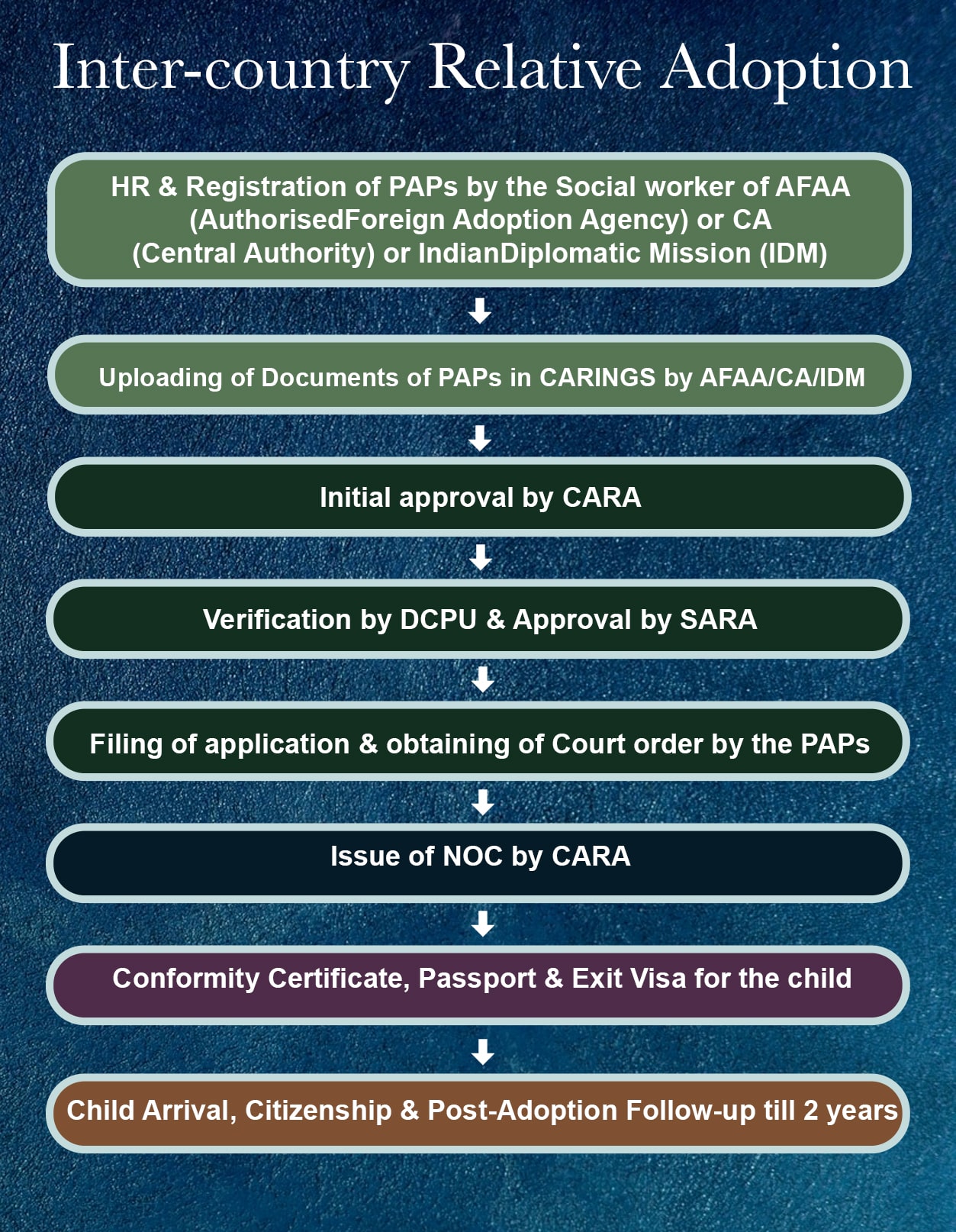
Adopting a Child in India for NRI/ OCI/ Foreigner
In case a Non-Resident India, Overseas Citizen of India or a foreign citizen wants to adopt a child in India, there is no restrictive law. In fact, such citizens are kept at par with the Indian citizens in terms of priority for adopting a child in India who may be orphaned, abandoned or surrendered. The following process has to be followed:
- Adoptive parents living in a country which is a signatory to the Hague Adoption Convention, approach the Authorised Foreign Adoption Agency or the Central Authority.
- In the absence of any such office, one may approach the Government department or Indian diplomatic mission.
- Apply for preparation of Home Study Report and registration under the Child Adoption Resource Information and Guidance System. Submit the requisite documents as well.
- After determining the eligibility and suitability of adoptive parents, the application is forwarded to the Specialised Adoption Agency whereby children who are legally free for adoption are available.
- Profiles of two children shortlisted as per preference shared by adoptive parents will be forwarded to the concerned authority through which application was received. It is henceforth forwarded to the adoptive parents as per local laws.
- Prospective parents have to reserve one of the profiles within 96 hours which is otherwise deemed withdrawn.
- If one of the children's profiles is reserved, adoptive parents have to sign the Child Study Report and Medical Examination Report of the child within 30 days from the date of such reservation. Parents can also request for a visit to see the child reserved and yet to be accepted for adoption.
- Acceptance of a reserved child has to be done within 30 days through concerned authorities. Otherwise such reservation is also deemed to be withdrawn. The same gets relegated to the bottom of the list and given an opportunity afresh if the Home Study Report remains valid.
- Proceeding the adoption process, Home Study Report is notarised, apostilled by competent authority, obtains a No-objection Certificate (NOC) from concerned authorities and a letter of approval from authorities at the receiving country.
- The child may be given for re-adoption foster care in India for a temporary period after getting the NOC while the court order is awaited.
- As the passport and VISA are issued to the child after issuance of adoption order from competent court, the adoptive parents may receive final custody of the child.
Note - If an Indian citizen or couple wants to adopt a child from foreign nation, the local laws of that country shall apply. Consultation of adoptive parents with family lawyers in the receiving country is advisable in such cases.
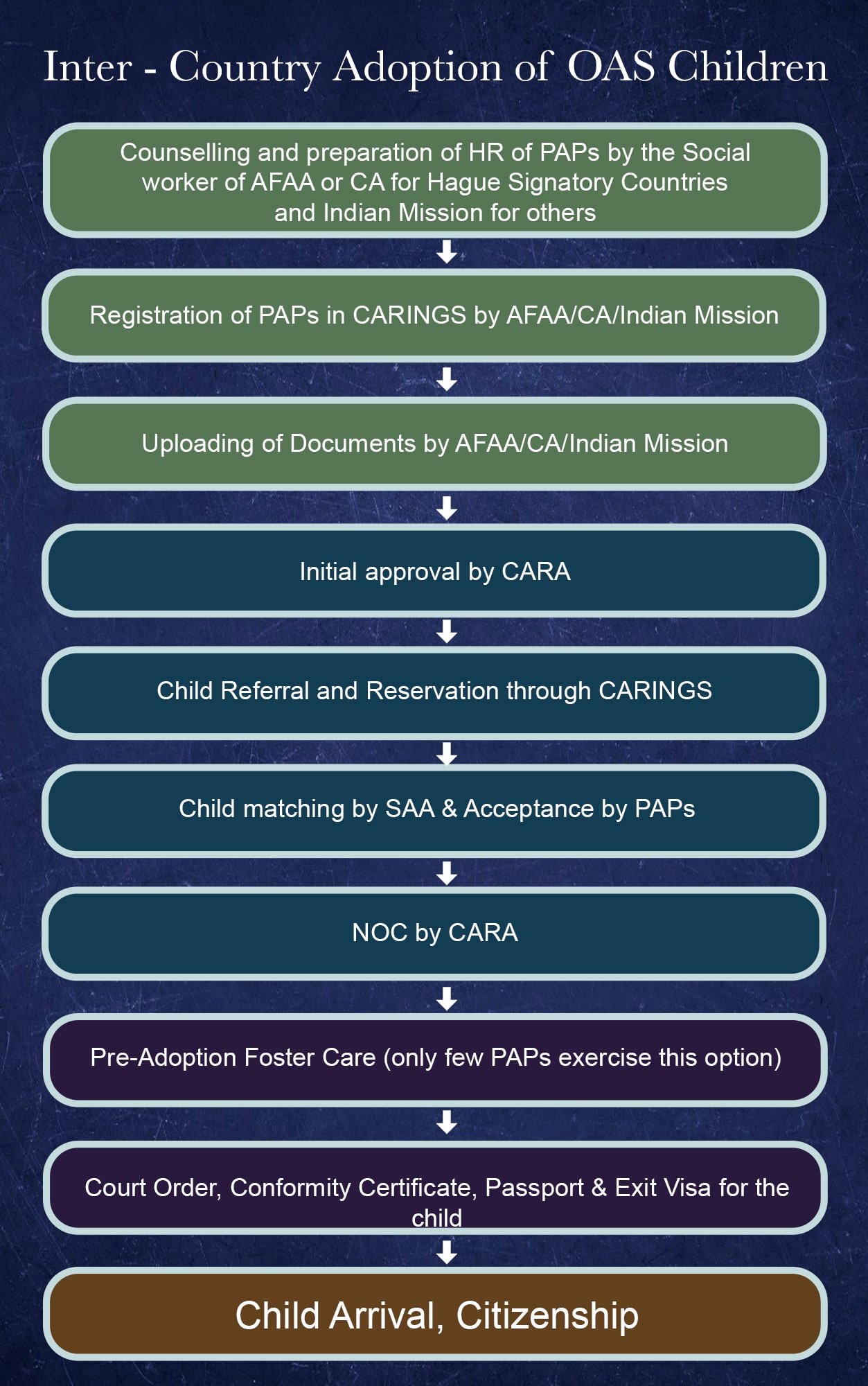
Who can Adopt a Child in India?[3]
- Person who is physically, mentally and emotionally stable, financially capable;
- Person who is not suffering from any kind of life threatening medical condition;
- Married couple who has completed 2 yeast of stable marriage;
- In case of married couple, where both the spouses consent for adoption;
- A single woman can adopt children of both genders (male and female child);
- A single man can only adopt a male child
- Couples with 3 or more children can not adopt another child unless its about children with special needs/ adoptive parents of relative or step parent
Q- Can a single woman adopt a child in India?
A- Yes.
Q- Can a single man adopt a child in India?
A- Yes, but a single man can only adopt a baby boy in India.
Q- Can a divorced woman adopt a child in India?
A- Yes.
Q- Can a divorced man adopt a child in India?
A- Yes. but a divorced man can only adopt a baby boy in India.
Who Cannot adopt a child in India?
- A person with life threatening medical condition
- Physically, mentally, emotionally or financially unstable person
- A married couple who have not completed 2 years of a stable marriage
- Married couple where one of the spouses does not consent to child adoption
- A single man can not adopt a female child
- Couples with 3 or more children can not adopt a normal child
What is the Age Limit to Adopt a Child in India?
A person below the age of 25 years can not adopt a child. There are various factors in terms of age which the adoptive parents have to take note of as shown below:
- There has to be an age gap of at least 25 years between the adoptive child and the adoptive parents
- For children upto 4 years - single parent should not be more than 45 year old, while the composite age of married couple has to be maximum 90 years
- For children 4-8 year age group - single parent should not be more than 50 year old, while the composite age of married couple has to be maximum 100 years
- For children 8-18 year age group - single parent should not be more than 55 year old, while the composite age of married couple has to be maximum 110 years
- The 25 years or other age-gap criteria does not apply to relative adoptions or adoption by step-parents
Who can be Adopted? - Rules to Adopt a Child in India
Child eligible for adoption[4] as per the applicable laws is as follows:
- An orphan child
- An abandoned child
- A surrendered child
- A child declared legally free for adoption by the Child Welfare Committee (CWC)
- Child of a relative
- Child of a spouse from previous marriage (to be adopted from biological parents by the step-parent)
Documents Required for Adopting a Child in India
- Application for adoption
- Current Passport sized photograph of prospective parents (husband-wife or single man/ woman)
- Certificate of Marriage (if a married couple)
- Birth certificate or proof of date of birth
- Residence proof
- Proof of income of the previous year
- Medical certificate proving that the prospective adoptive parent(s) do not suffer from any chronic, contagious or fatal disease; are fit to adopt
- Divorce decree or death certificate of the spouse (In case the applicant is divorced or widowed)
- Reference letters from two acquaintances or relatives in support of adoption
- Consent of elder child in the adoptive family (If the child is above 5 years)
Note - It should be noted that in no case does a petition for adopting a child in India require attaching an Infertility report for adoptive parents. Regardless of whether it is an in-country, inter-country or relative adoption, adoptive parents do not need to prove their fertility or infertility during the process to adopt a child in India.
Documents for Inter-Country Adoption in India
- Applicant photographs
- Home Study Report (To be uploaded after CARINGS registration)
- Passport of prospective parents
- Overseas Citizen of India card
- Birth certificate
- Residence proof
- Income proof of last year
- Medical certificate to prove that either of the prospective adoptive parents does not suffer from any chronic, contagious or fatal disease and are fit to adopt
- Police Clearance certificates to prove antecedents of prospective parents
- Marriage Certificate (in case of married couple)
- Divorce decree or death certificate of the spouse (If the applicant is divorced or widowed)
- In case of single prospective parent, an undertaking from relative
- Consent of older child to be adopted
- Permission of concerned authorities at the receiving country
- In case of relative adoption, family tree depicting relationship of the adoptive parents with the relative child
- Consent of biological family
- Child Welfare Committee permit towards legal guardian to surrender the child in adoption with the said relative
- Family background report by District Child Protection Unit
Court Verification Before Order to Adopt a Child in India
The Section 61 of Juvenile Justice Act, 2015 lays the conditions which the court should be satisfied with before releasing an adoption order:
- That adoption process is for the child’s welfare
- Age and understanding of the child have been given due consideration
- Apart from the authorised adoption fees or service charge or child care corpus, no other payment has been made by the adoptive parents against anyone involved in the adoption process
- The court shall conduct in-camera proceedings for adoption in India
- The adoption application has to be disposed of within 2 months of filing date.
[1] Section 2 (2) of Juvenile Justice Act, 2015.
[2] Section 2(52) of the Juvenile Justice Act, 2015.
[3] Section 5 of Adoption Regulation, 2017.
[4] Section 4 of Adoption Regulations, 2017.
























